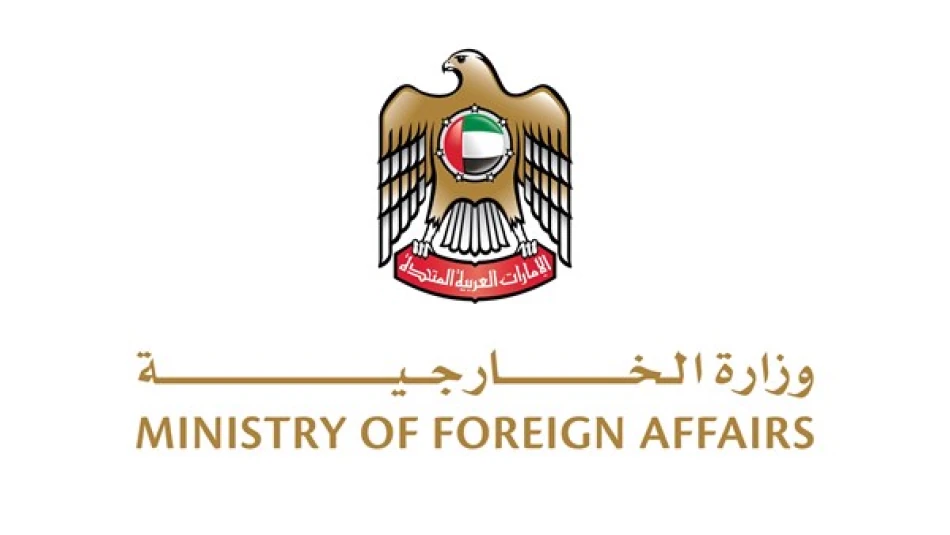
UAE Condemns Israel's Illegal Occupation of Gaza, Calls for Immediate Ceasefire
UAE Condemns Israeli Occupation Plans for Gaza Despite Abraham Accords Partnership
The United Arab Emirates has issued its strongest condemnation yet of Israeli government decisions regarding Gaza occupation, marking a significant diplomatic moment that highlights the complex balance between regional normalization efforts and Palestinian solidarity. The statement represents a rare instance of sharp criticism from Abu Dhabi toward its Abraham Accords partner, signaling that economic and security cooperation has limits when core regional stability is at stake.
Sharp Diplomatic Language Signals Policy Shift
In an unusually forceful statement from its Foreign Ministry, the UAE denounced what it called "illegitimate practices that contradict international law" and warned of "catastrophic consequences" from Israeli actions in Gaza. The Emirates specifically called for urgent international intervention to prevent further civilian casualties and halt what it described as attempts to displace the Palestinian population.
This language marks a notable escalation from the UAE's typically measured diplomatic tone, particularly regarding Israel since the 2020 Abraham Accords normalized relations between the two nations. The statement suggests that Abu Dhabi views current developments as crossing red lines that threaten broader regional stability.
Strategic Calculations Behind the Condemnation
Regional Stability Concerns
The UAE's position reflects deep concerns about regional spillover effects that could undermine its economic diversification strategy and position as a Middle Eastern business hub. Historical precedent shows that prolonged conflicts in Gaza often trigger wider regional tensions, potentially affecting trade routes, energy markets, and foreign investment flows that are crucial to the Emirates' post-oil economic vision.
Balancing Act with Abraham Accords
The statement creates a delicate diplomatic challenge for both nations. The UAE has invested significantly in normalizing relations with Israel, including substantial trade agreements and security cooperation. However, Abu Dhabi appears to be drawing clear distinctions between bilateral cooperation and support for policies it views as destabilizing.
This approach mirrors strategies employed by other Abraham Accords signatories like Bahrain and Morocco, who have maintained criticism of Israeli policies while preserving normalized relations. The model suggests these nations view compartmentalization as essential to managing domestic and regional pressures.
International Implications and Market Considerations
Energy and Investment Markets
The UAE's stance carries weight in international markets given its position as a major oil producer and regional financial center. Sharp escalations in Gaza historically correlate with energy price volatility and flight-to-safety movements in regional markets. The Emirates' call for urgent international intervention suggests concerns about prolonged instability affecting its economic interests.
Diplomatic Leverage Strategy
By positioning itself as a voice for de-escalation while maintaining ties with all parties, the UAE appears to be positioning itself as a potential mediator. This strategy has proven effective in previous regional crises, where Abu Dhabi's relationships across traditional divides have created unique diplomatic opportunities.
The Two-State Solution Imperative
The UAE's emphasis on the two-state solution as the only path to regional stability reflects a broader consensus among Gulf states that the Palestinian issue cannot be permanently sidelined. This position suggests that normalization with Israel was viewed as a means to eventually advance Palestinian statehood, not abandon it.
The timing of this reaffirmation is significant, as it comes amid growing international debate about the viability of the two-state framework. The UAE's insistence on this approach indicates that Gulf states view alternative scenarios as potentially more destabilizing than the current status quo.
Testing the Limits of Normalization
This diplomatic moment reveals the conditional nature of Middle Eastern normalization efforts. While economic and security cooperation may continue, the UAE's statement demonstrates that regional powers maintain independent positions on core issues of war and peace. The challenge moving forward will be whether such compartmentalization can survive sustained periods of high tension and civilian casualties.
The international community's response to the UAE's call for intervention will likely influence how other regional powers position themselves, potentially reshaping the diplomatic landscape around the conflict and testing the durability of recent normalization agreements.
Most Viewed News

 Layla Al Mansoori
Layla Al Mansoori






